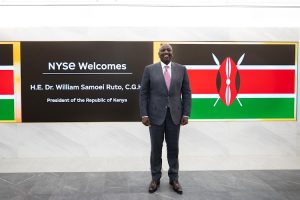Nairobi Securities Exchange received a massive boost after foreigners bought shares worth Ksh668.4 million in August.
According to NSE market data, the foreign investors turned out to be net buyers in August signaling a reprieve to Kenya’s government following reports of fleeing the market due to volatility.
The foreign investors had dumped Kenyan shares for other frontier markets in favour of safe haven assets. They attributed the mass exodus to new tax regimes which had affected businesses in the country.
Latest figures from NSE reversed a net selling position of Ksh2.8 billion in July pointing at a recovering investment trajectory in the country. The positive flows largely pointed to returning interest by foreign investors in the NSE after their purchase of stocks worth Ksh113 million earlier in June.

In May, the 2023 African Economic Outlook (AEO) report attributed the market slump to the weakening Kenyan shilling which sparked anxiety among investors prompting some to explore other markets.
” Currency weaknesses in some of Africa’s more globally integrated economies (Kenya, Nigeria, and South Africa) are expected to persist in 2023, largely due to potential capital outflows as investors search for safe assets in advanced economies,” the report read in part.
In July, Tanzania President Suluhu Hassan noted that investors were rushing to the country due to political stability. She took a swipe at Kenya which had experienced a series of anti-government protests affecting businesses and lowering investors’ confidence.
The Director of Tanzania Investment Institute recently stated on TV that since May the country has received the largest number of foreign investors because of the protests in Kenya. Investors fear violence,” Suluhu stated.
However, President William Ruto invited former Prime Minister Raila Odinga for bipartisan talks calming anti-government protests and restoring peace in most parts of the country.
According to the Stanbic Kenya Purchasing Managers Index (PMI), the talks revived businesses in many parts of the country ending a series of losses experienced previously.
“Survey panelists frequently cited that greater political stability led to a recovery in output, particularly in services and manufacturing,” analysts at Stanbic Bank and American analytics firm, S&P Global, wrote in the PMI report for August.
“Job creation accelerated and purchasing activity picked up, whilst firms grew more confident about their output prospects,” the survey added.
